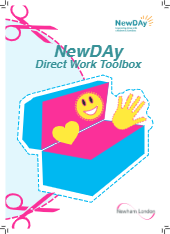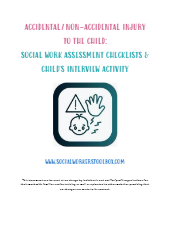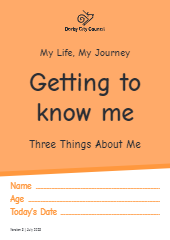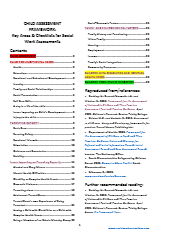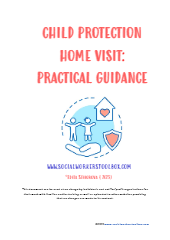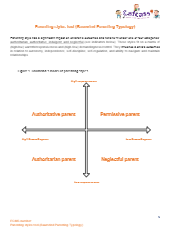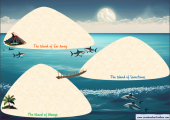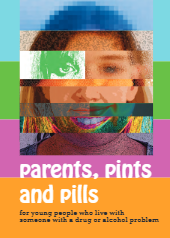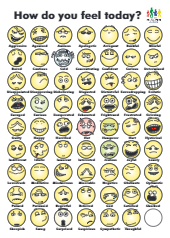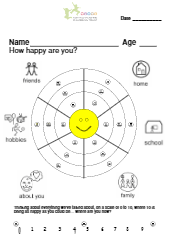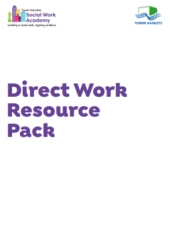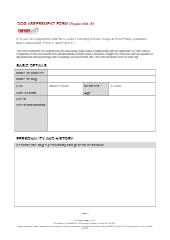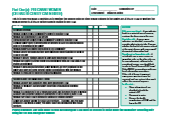Category: Assessment
NewDay Direct Work Toolbox – Voice of the Child Worksheets and Activities
NewDay Direct Work Toolbox: Voice of the Child Worksheets and Activities is a carefully curated resource designed by the NewDay team to support professionals working with children and young people…
Parenting Capacity Social Work Assessment Framework: Guidance and Template
The “Southwark Parenting Assessment Framework” is a comprehensive document designed to assist practitioners in assessing a parent’s ability to meet the needs of a child. It provides structured guidance for…
Neglect Toolkit: Guidance and Assessesment Tool
The Neglect Toolkit: Guidance and Assessment Tool is a comprehensive resource developed to assist professionals in assessing and addressing cases of neglect concerning children’s well-being. The toolkit provides a structured…
Accidental/non-accidental injury to the child: Social work assessment checklists & child’s interview activity
(You can download the guidance below in a PDF document here.) SOCIAL WORKER’S QUESTIONS FOR EACH ADULT WHO WAS PRESENT DURING THE INJURY In situations involving a concerning child injury, it…
Voice of the Child Toolkit
The Voice of the Child Toolkit, developed by Derby City Council, offers a collection of useful tools designed to engage and hear the perspectives of children and young people. This…
Social Work Supervision and Reflection Tools & Resources
Exploring Identity, Power, Values and Ethics Social GGRRAAAACCEEESSSS This tool provides a framework called Social GGRRAAAACCEEESSSS for reflecting on different aspects of personal identity as a person and as an…
Graded Care Profile 2 – Quality of Care/Neglect Assessment Tool & Guidance
The Graded Care Profile 2 (GCP2) is an updated version of the original Graded Care Profile tool, designed to assess the quality of care provided to an individual child over…
The Safety House: A child protection tool for involving Children in Safety Planning
“The Safety House: Involving Children in Safety Planning” is a practical tool designed to engage children in the process of safety planning within child protection systems. Developed by Sonja Parker,…
The Child Assessment Framework: Key Areas & Checklists for Social Work Assessments
The Child Assessment Framework: Key Areas & Checklists for Social Work Assessments is an invaluable resource that assists social workers in systematically gathering essential information to promote the well-being and…
Neglect Toolkit for Practitioners: Assessment tools, checklist, questionnaires, worksheets
The Neglect Toolkit for Practitioners is an exceptional resource developed by East Sussex County Council. This toolkit provides a wide range of assessment tools, checklists, questionnaires, and worksheets to support…
Child Protection Home Visit: Practical Guidance
(You can download the guidance below in a PDF document here.) WHEN THERE IS NO ANSWER WHEN YOU KNOCK: If the family does not answer the door when you knock, listen…
Parenting styles tool
The Parenting Styles Tool is a valuable resource developed by Cafcass to help parents and carers assess their own parenting style and understand its impact on their child. This tool…
Three Islands Activity guidance, template & record sheets
The Three Islands is a fun and interactive direct work activity for social workers and practitioners to engage children in exploring their preferences, views, wishes and concerns. This activity enables…
Parents, Pints & Pills: Booklet for young people who live with someone with a drug or alcohol problem
Parents, Pints & Pills is a booklet created by young carers for young people living with a family member with a drug or alcohol problem. It provides valuable support and…
Home Visit Observations of Parent-Child Interactions Questionnaire/Checklist
The Home Visit Observations of Parent-Child Interactions Questionnaire/Checklist is a valuable toolkit designed to support social workers and practitioners in observing and influencing parent-child interactions during home visits. The toolkit,…
All about me: Direct work sheets & activities (booklet)
The All About Me: Direct Work Sheets & Activities booklet is an engaging and interactive resource developed by Socialworkerstoolbox.com. With 40 thoughtfully designed sheets, it aims to prioritise the voice…
Feelings faces: How do you feel today?
The “Feelings Faces: How Do You Feel Today?” poster is an engaging and versatile resource designed to support 1:1 direct work with children and young people. This poster showcases a…
My Feelings Colouring Chart
The “My Feelings Colouring Chart” is a valuable resource that empowers children to explore and express their emotions in different areas of their lives. With dedicated sections for friends, home,…
Child and Youth Participation Toolkit (wishes/feelings direct work worksheets/activities)
The Child and Youth Participation Toolkit, developed by Tusla Child and Family Agency, is an invaluable resource designed to facilitate meaningful engagement with children and young people. This comprehensive toolkit…
30+ tools for 1:1 work with children (assessment, planning & intervention)
The Kids Central Toolkit aims to provide workers and services with information, resources and tools to use child-centred approaches in their work with children, young people and families. The Toolkit…
Direct Work with Children & Young People: Resource Pack
The “Direct Work Resource Pack” is an invaluable compilation of tools and interventions designed for professionals engaged in direct work with children and young people. This helpful resource pack provides…
My feelings workbook: naming & exploring emotions
The “My Feelings Workbook” is a powerful resource designed to help children recognise and explore their emotions. This book aims to support children in the healing process by teaching them…
This is my World: Gathering child’s views on self, family, friendships, school, illness & the future
“This is My World” is an invaluable workbook created to support therapists in their work with children and adolescents diagnosed with a medical illness. The workbook contains a range of activities…
Dog risk assessment form
The Dog Risk Assessment Form is a template created by the British Association for Adoption and Fostering (BAAF) to assess the suitability and significance of a dog in the context…
Female genital mutilation (FGM) risk assessment templates
The Female Genital Mutilation (FGM) Risk Assessment Templates are a set of four documents designed to assist social workers in assessing the risk of FGM in different scenarios. The templates…
Home conditions observation record/framework
The Home Conditions Observation Record/Framework is a valuable tool designed to assist social workers in observing and documenting the conditions of a home. It provides a structured framework that covers…
Observations Checklist: what to look for in assessing attachment and bonding (tool)
The Attachment and Bonding Observations Checklist is a tool that outlines specific behaviors to observe when assessing the attachment and bonding between a child and their parent or caregiver. The…
Children’s Participation Toolkit for Social Workers (activities & worksheets)
The Children’s Participation Toolkit for Social Workers is a comprehensive booklet designed to facilitate the active involvement of children in the social work process. Packed with engaging activities, worksheets, and…
‘Say it your own way’: 40+ worksheets facilitating children’s participation in assessment
‘Say it your own way’ is an inclusive and empowering booklet that prioritises the voice of the child, their wishes, feelings, and views. It consists of 40+ engaging worksheets designed…
Pre-Birth Assessment Tool
The Pre-Birth Assessment Tool is a resource designed to support professionals in thoroughly examining various factors related to a mother’s pregnancy and the overall circumstances of the family. The tool…
